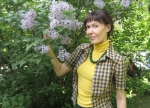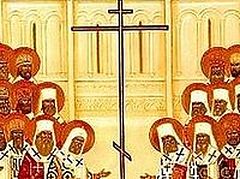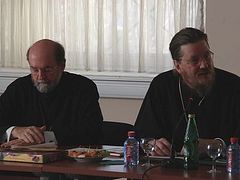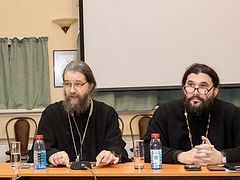Moscow, June 18, 2015

As indicated by its title, “Religious aspects of Russian culture in the 19th and early 20th centuries”, and in accord with the traditional bent of PSTGU, the program offers students the opportunity to engage in an in-depth study of both religious history and the current religious landscape of Russia. It also seeks to illuminate various aspects of the Russian mentality, its historical and cultural heritage, its religious dimensions and its cultural manifestations in everyday life. The course aims to help students to assess and comprehend the differences between Western and Eastern religious and religious-philosophical schools of thought. These differences influenced historical semantics and semiotics, the process of socialization in Russia, the creation of new norms and categories of thought – including those of religious thought –, and also the creation of the religious experience, domestic and professional ethics, and the way of thinking about everyday life, practices and customs. Some distinctive features of the “Russian world” and of the “Russian idea” were elaborated upon, and were reflected in, the historical period under examination. Without the knowledge that permits a student to orient himself or herself within this context, life and work in Russia can be challenging.
Download Power Point presentation
Main Features of a Master’s degree in “Religious Aspects of Russian Culture in the 19th and early 20th centuries”
This Master’s degree proposes:
- To give the necessary expertise for analyzing religious imagery, concepts and phenomena (starting from basics, such as “relations between Church and State”, “ecclesiasticism”, “freedom of conscience”, “religious experience”, “religious conversion”, “marginal religiousness”) and relating them to Russia’s present-day cultural and socio-political context.
- To identify the distinguishing features of religion in different fields of Russian life, including the relation between Church and State, historical everyday life, literature, philosophy, art, and music.
- To study the individual religious experience of the most important proponents of Russian culture in the 19th and early 20th centuries, and the characteristics of their religious thought.
The unique nature of this
program lies in its cross-curricular character, connecting
particular knowledge in different scientific areas such as
religious sciences, history of religion, Orthodox
theology, history of the Russian Church, and history of
Russian culture in the 19th and early 20th centuries. This
is the first time in Russia that such an interdisciplinary
approach has been implemented. Its aim is to create
specialists who can respond to the current needs and
concerns of state, social, business and religious
institutions.
The objective of this program is
to train graduates who will be able to communicate in a
Russian-speaking environment, both within the Russian
Federation and abroad. Graduates will be trained to
formulate and solve problems requiring an in-depth
knowledge in the field of religious sciences and theology,
and to help in choosing, modifying or creating necessary
research strategies for the following cases:
- Collaboration between religious organizations and social or public institutions.
- Expert consulting on religious issues for public companies of different kinds, for-profit and non-profit organizations; creating and supplying material about religious matters for the mass media.
- Working both in international organizations, and in national public and private structures that aim at cooperating with Russian institutions and organizations.
- Assisting different kinds of international and intercultural exchange with Russia.
- Elaborating marketing strategies for the Russian market.
- Preparing publications on different topics, mainly of historical, philosophical, cultural and literary concern.
- Formulating new learning paths in religious sciences, theology, cultural studies and similar subjects.
Course Structure
The above-mentioned course of study is composed of five blocks.
-
Religious Sciences
-
Theology
-
History
-
Philosophy
-
Cultural Studies
The first block fulfills the standard requirements for university courses in Religious Studies, and includes basic subjects such as “Religion in the Contemporary World” and “Contemporary Problems in Religious Sciences.”
The second block will include a revised version of the course, “Basics of Orthodoxy”, together with other courses organized by the Faculty of Theology, and an interactive seminar titled “Religious Aspects of Culture: Past and Present.”
The third block includes the following courses: “Old Believer Doctrine and Sects,” “Church-State Relations in the 19th and Early-20th Centuries”; the seminar “The Problem of Freedom of Conscience in Russia in the 19th and Early-20th Centuries ”, and lecture courses taught by eminent academics titled “History of Theology and Science in Russia”; “The Russian Intelligentsia and the Church”; “Russia and the Russian Church in the 19th Century Through the Eyes of Foreigners”; and “Russian Religious Practice in the 19th Century”.
The fourth block consists of different courses created by the staff of the departments of Philosophy of Religion and of Religious Aspects of Culture in the Faculty of Theology. The following courses will be offered: “History of Religious Philosophy”; the seminar “Sources of Russian Religious Philosophy” (includes basic training in archival science); specialized lectures such as “Main Schools of Russian 19th Century Russian Religious Thought” (in which Slavophile theological views will be treated extensively), and “Philosophical and Religious Concerns in Silver Age Russia”.
The fifth block includes both standard requirements for a Master’s in Religious Sciences, and new seminars and lectures including: “Christianity and Russian Literature During the 19th and 20th Centuries”; “Tolstoy, Dostoevsky and the Religious Crisis in Russia”; and “Secular Leanings in Russian Culture: Art, Architecture, Music, and Theatre.”
Eminent academics from Russia and abroad have been invited to teach and lecture, including professors from the St. Tikhon Orthodox University, the Lomonosov Moscow State University (Faculty of History and Philosophy), the Maxim Gorky Literature Institute, the Russian Academy of Sciences (Russian Literature Institute), the Slavic Department of Humboldt University in Berlin, and the Catholic University of the Sacred Heart in Milan.
A central aspect of the curriculum is a two-year scientific research seminar, which is distinguished by its cross-curricular character. All students and lecturers will take part in the seminar. The aim of the seminar is both to field questions from students regarding their theses, and to hear talks from students and academics working in different fields of the humanities.
The second semester of the second year of the program will be reserved for students focus exclusively on their theses.
Further Information
Prerequisites for enrollment
are:
- A Bachelor’s degree in one of the following fields: Theology, Philosophy, History, Religious Studies, Philology, Literature, Slavic Studies.
- Proficiency in the Russian language (students should be able to follow lectures and participate in seminars).
Term of the program: two years. Students may qualify to complete the degree through night classes and correspondence courses. Degree Granted: Master’s Degree in Religious Science, specializing in “Religious Aspects of Russian Culture in the 19th and early 20th Centuries”. Admission is subject to the successful passing of an entrance test.
* Tuition costs: 60.000 Russian
rubles.
*The annual fee covers:
-
Excursions in Moscow and the Moscow region
-
Trips to historical sites in Russia
-
Visits to Moscow libraries and archives
-
Participation costs for conferences taking place in Yasnaya Polyana (two times a year)
* The University administrative office is willing to help students to search for accommodations in Moscow (private apartments or University dormitory rooms / twin rooms. The estimated cost for accommodations is 10.000 Russian rubles a month)
* Courses will begin in September 2015.
* Admissions will be announced in June and July. Information about how to apply and the documents required for application can be found on the University site.
* All foreign students should obtain a notary translation of their documents and ensure that they complete the process for having their foreign qualifications recognized (nostrifikatsiya). All foreign degrees and qualifications must be verified by means of this process. More information is available at http://pstgu.ru/en/international_stud/general_inform/adm_proc/
Director
Very Rev. Georgy Orekhanov, Vice Rector for International Cooperation, Doctor of Church History, Doctor of History
Teaching Staff
http://pstgu.ru/faculties/theological/entrants/magistracy/
For more information, please contact
Elena Nikonova, International
Relation Office St. Tikhon’s Orthodox
University
Tel. +7 916 416 01 84;
e-mail: enikonova@pstgu.ru





